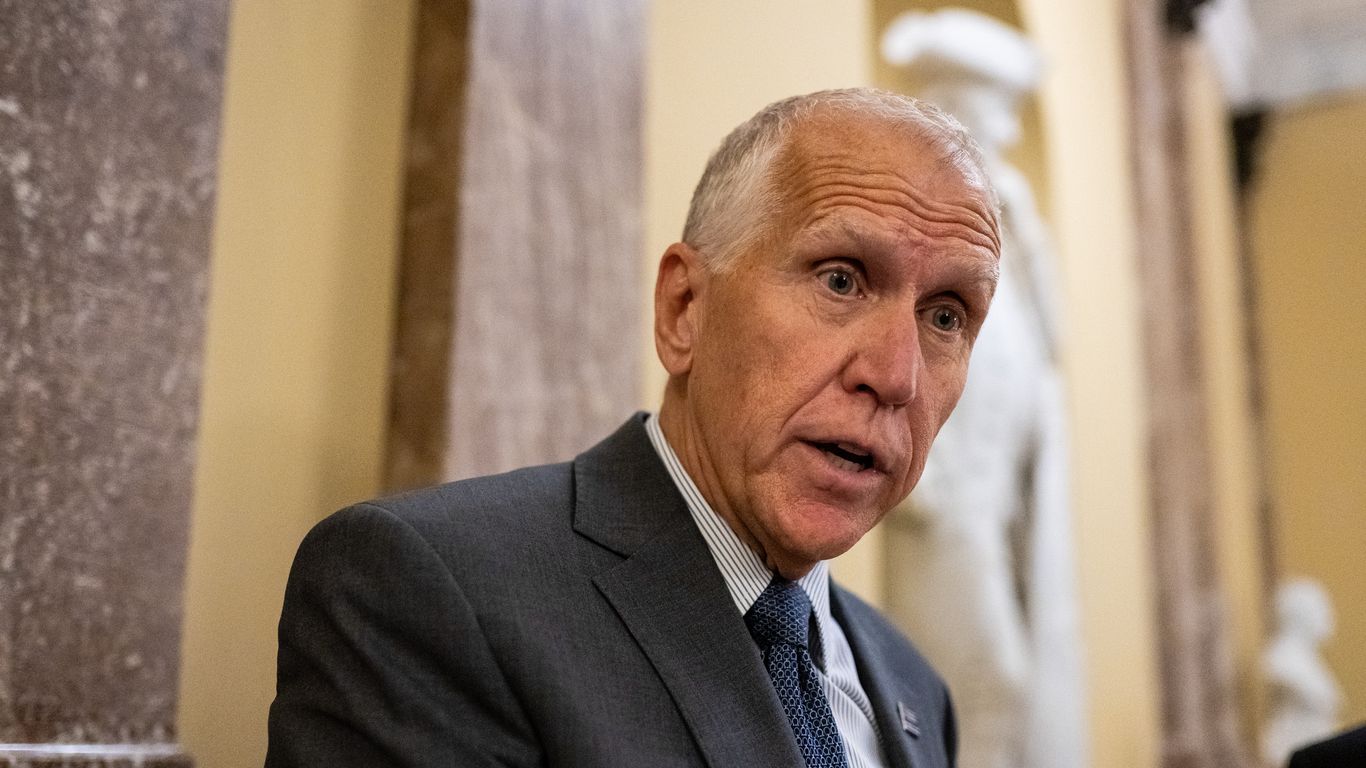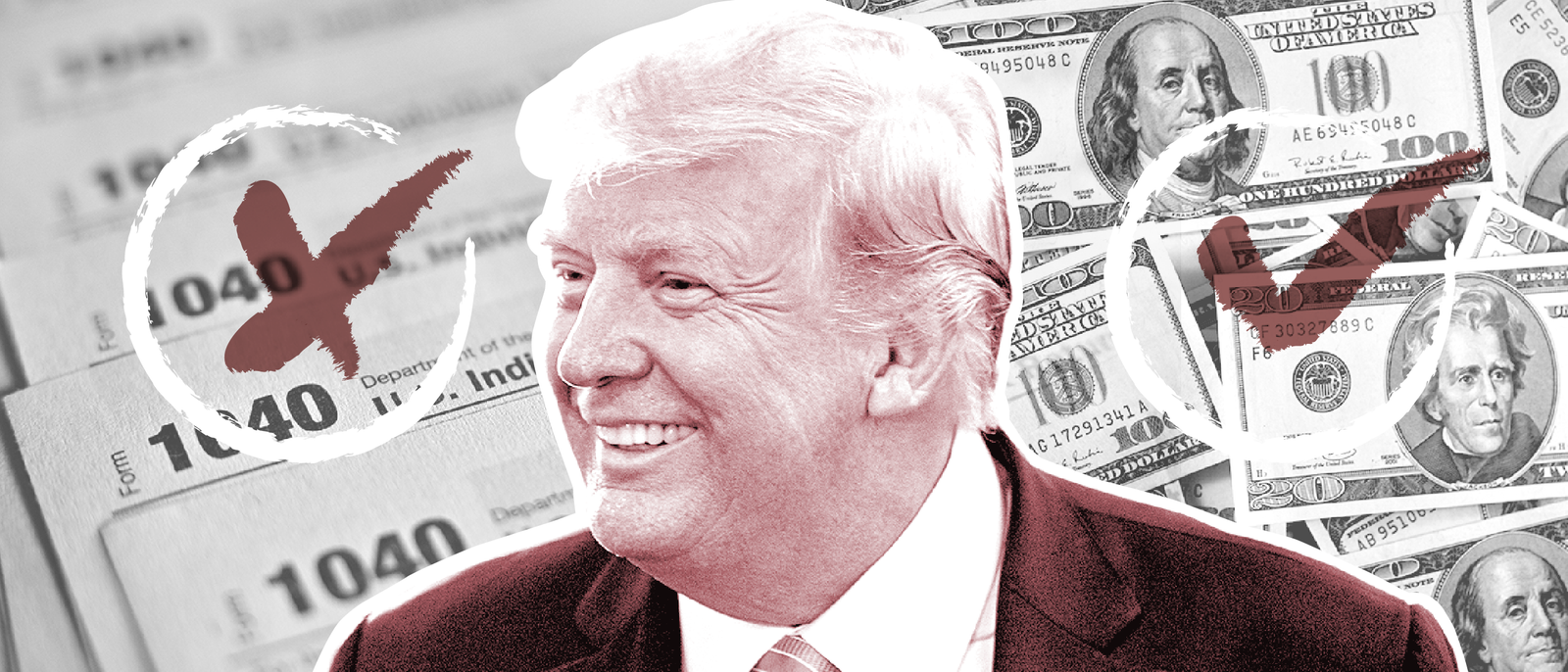Trump's Tax Bill: Controversy and Consequences

Introduction
The Senate Republicans are pushing to vote on President Trump's massive tax bill on Monday, according to The Washington Post. This legislation has been met with much controversy, as projections released on Sunday suggest that it will cause the national debt to soar even more than previously estimated.
Background
The bill, which is a key component of President Trump's agenda, has been met with division among the Republican party. Despite this, they are determined to push it towards passage this week, as reported by Reuters. This has caused tension within the party, with some members, such as Senator Thom Tillis, announcing they will not seek reelection next year after receiving backlash from President Trump for voting against the motion to start debate on the bill, according to NPR.
Current Scenario
President Trump has been actively involved in urging House Republicans to move forward with the tax bill, according to sources. He has made it clear that he wants the bill on his desk by July 4th, as reported by Axios. However, the Senate's version of the bill has caused concern, as it would add $3.3 trillion in new debt, which is significantly more than the House-passed version, according to Axios.
One of the key components of the tax bill is the addition of work requirements for Medicaid recipients, which has caused concern among those who rely on the program. This has sparked debate within the Republican party, with some voicing their concerns and others viewing it as a necessary measure, according to Reuters.
Conclusion
The tax bill has also had implications on the 2026 elections, with Medicaid spending cuts emerging as a key topic of discussion, according to The New York Times. This has highlighted the division within the Republican party and the challenges they face in passing the bill. With President Trump's visit to the Middle East, his focus on the bill and its potential impact on the national debt remains a key point of discussion, as reported by The Guardian. It remains to be seen how the bill will progress and the potential consequences it may bring. Stay tuned for updates on the developments surrounding the tax bill.
About the People Mentioned
Donald Trump
Donald John Trump, born June 14, 1946, in Queens, New York, is an American businessman, media personality, and politician. He graduated from the University of Pennsylvania’s Wharton School in 1968 with a degree in economics. In 1971, he took over his family’s real estate business, renaming it the Trump Organization, through which he expanded into building and managing skyscrapers, hotels, casinos, and golf courses. Trump gained widespread fame as the host of the reality TV show *The Apprentice* from 2004 to 2015, which helped establish his public persona as a successful entrepreneur. Trump entered politics as a Republican and was elected the 45th president of the United States, serving from 2017 to 2021. His presidency was marked by significant policy actions including tax cuts, deregulation, the appointment of three Supreme Court justices, renegotiation of trade agreements (notably replacing NAFTA with the USMCA), and a focus on immigration control including border wall expansion. He withdrew the U.S. from international agreements such as the Paris Climate Accord and the Iran nuclear deal, and engaged in a trade war with China. His administration’s response to the COVID-19 pandemic was criticized for downplaying the virus’s severity. Trump was impeached twice by the House of Representatives—first in 2019 for abuse of power and obstruction, and again in 2021 for incitement of insurrection—but was acquitted by the Senate both times. After losing the 2020 election to Joe Biden, Trump challenged the results, culminating in the January 6, 2021, Capitol riot. He remains a central figure in American politics, having won the 2024 presidential election and returned as the 47th president in 2025, continuing to promote policies aimed at economic growth, border security, and military strength[1][2][3][4].
Thom Tillis
Thomas Roland Tillis, known as Thom Tillis, is an American politician serving as the U.S. Senator for North Carolina. Born on August 30, 1960, in Jacksonville, Florida, Tillis grew up in a working-class family and faced financial challenges early in life. After high school, he worked as a warehouse records clerk before pursuing higher education, earning a bachelor's degree from the University of Maryland University College in 1997[1][2]. Tillis built a successful career in the private sector, working as an executive at IBM and a partner at PricewaterhouseCoopers. His 29-year tenure in technology and management consulting provided him with a deep understanding of policy-making and organizational management[2][4]. He transitioned into public service, serving as a member of the Cornelius Board of Commissioners and later as the PTA president at Hopewell High School. In 2006, he was elected to the North Carolina House of Representatives, where he served as Speaker from 2011 to 2014[2][3]. Tillis was first elected to the U.S. Senate in 2014 and re-elected in 2020. He is a member of several key Senate committees, including Finance, Veterans’ Affairs, and Judiciary[3][5]. As Senator, Tillis has focused on pragmatic policy solutions and job creation. Recently, he has been involved in sponsoring legislation such as the National Park System Long-Term Lease Investment Act[5]. Tillis resides in Huntersville, North Carolina, with his wife Susan, and they have two grown children[2][3].
About the Organizations Mentioned
The Washington Post
## Overview The Washington Post is a leading American daily newspaper and digital news organization based in Washington, D.C. Known for its rigorous political reporting and investigative journalism, it is widely regarded as one of the nation’s most influential newspapers, alongside The New York Times[1][2]. The Post has a significant national readership, with millions of digital subscribers and a strong presence in the Washington metropolitan area, though its print circulation has declined in recent years[1]. ## History Founded in 1877, The Washington Post initially struggled financially and editorially until financier Eugene Meyer purchased it out of bankruptcy in 1933. Under Meyer and later his daughter Katharine Graham and her husband Phil Graham, the paper expanded its influence, acquiring rival publications and building a reputation for fearless journalism[1][2]. The Post’s most famous moment came in the 1970s, when reporters Bob Woodward and Carl Bernstein uncovered the Watergate scandal, leading to the resignation of President Richard Nixon. This cemented the paper’s role as a watchdog for government accountability[1][2]. ## Key Achievements The Washington Post has won 78 Pulitzer Prizes as of 2025, the second-most of any U.S. publication[2]. Its reporting has been instrumental in major national stories, including the Pentagon Papers, secret NSA surveillance, and the January 6 attack on the U.S. Capitol[2]. The paper is also one of the few American newspapers to maintain foreign bureaus, with international news hubs in London and Seoul[1]. ## Current Status In 2013, the Graham family sold The Washington Post to Jeff Bezos, founder of Amazon, for $250 million[1][2]. Under Bezos’s ownership, the paper has expanded its digital offerings and global reach. As of 2025, it has over 2.5 million digital subscribers, though print subscriptions have dipped below 100,000 for the first time in over half a
Reuters
**Reuters** is a leading global news agency founded in 1851 by Paul Julius Reuter, a German immigrant who innovatively combined telegraphy and carrier pigeons to transmit financial and news information rapidly between cities like London and Paris[1][2][4]. Starting from a modest office in London’s financial district, Reuters quickly gained a reputation for speed, accuracy, and impartiality, exemplified by its early scoop on the death of U.S. President Abraham Lincoln in 1865, beating competitors by hours[1][2]. Historically, Reuters evolved from a commercial news service focused on stock prices for banks and brokerage houses to a comprehensive international newswire serving newspapers worldwide. Its expansion reflected the growing importance of timely, reliable news in business and global affairs[2][3]. The company’s independence and editorial integrity have been safeguarded since 1947 by the Reuters Trust Principles, which commit Reuters to unbiased and accurate reporting[4]. Today, Reuters operates as part of Thomson Reuters, a Canadian multinational headquartered in Toronto. It is recognized as the largest global news agency, with over 2,600 journalists in 165 countries producing around 2 million unique news stories annually in 12 languages[5]. Reuters embraces cutting-edge technology to deliver breaking news, multimedia, and authenticated content to media, technology firms, governments, and corporations, ensuring fast and seamless distribution[5]. Notable achievements include winning over 300 journalism awards in the last decade, such as the 2024 Pulitzer Prizes for National Reporting and Breaking News Photography, and the George Polk Award for Business Reporting, underscoring its leadership in business and technology journalism[5]. Reuters continues to innovate, recently unveiling AI tools to enhance video production and engagement, reflecting its commitment to shaping the future of news in a digital age[5].
NPR
National Public Radio (NPR) is a premier American public broadcasting organization headquartered in Washington, D.C., with NPR West based in Culver City, California. It functions primarily as a national syndicator, distributing content to a network of over 1,000 public radio stations across the United States, most of which are owned by non-profit entities such as public school districts, colleges, and universities[1]. Founded in 1970, NPR operates independently of government or corporate control, relying financially on dues and fees from member stations, corporate underwriting, and grants from the publicly funded Corporation for Public Broadcasting. This financial model helps maintain its editorial independence and diverse programming[1]. NPR is best known for its flagship news programs, *Morning Edition* and *All Things Considered*, which are among the most popular drive-time radio shows nationally, attracting weekly audiences of approximately 15 million each. These programs exemplify NPR’s strong reputation for in-depth, factual, and engaging news coverage, appealing to listeners interested in business, technology, and broader cultural topics[1]. Beyond radio, NPR manages the Public Radio Satellite System, which distributes not only its own programming but also content from independent producers and networks like American Public Media and Public Radio Exchange (PRX). It also serves as a primary entry point for the Emergency Alert System. NPR content is widely accessible on demand via online streaming, mobile apps, and podcasts, reflecting its strategic adaptation to digital media trends and the growing podcast market[1][2]. Notable aspects of NPR include its commitment to innovation in public media and its collaboration with leading organizations to navigate challenges such as historic federal funding cuts. NPR’s role in shaping public discourse through trusted journalism and storytelling makes it a vital institution in the U.S. media landscape, especially for audiences focused on business and technology news[1][2].
Axios
Axios is a dynamic media company founded in January 2017 by veteran journalists Jim VandeHei, Mike Allen, and Roy Schwartz, with a mission to transform how news is delivered in the digital age. Frustrated by the clutter, bias, and inefficiency of traditional media, the founders engineered Axios around a simple but powerful idea: deliver the clearest, smartest, and most trustworthy news experience for both audiences and advertisers. Axios quickly gained recognition for its concise, clinical reporting style—presenting facts without partisan opinion, and avoiding editorial pages or overt political endorsements. This commitment to neutrality and factual integrity has helped Axios build trust with readers seeking reliable, efficient news. Axios covers a broad range of topics including politics, technology, business, health, science, and sports, with a signature format that distills complex stories into digestible, bullet-pointed updates. The company’s approach has been praised for its reliability and balanced perspective, earning it a “Middle” bias rating and high marks for factual reporting from independent media analysts. Beyond its newsroom, Axios expanded into enterprise communications with Axios HQ, an AI-powered platform that helps organizations—from startups to Fortune 500 companies—craft clear, impactful internal communications. This innovation reflects Axios’s broader influence in shaping how information is shared in both media and business environments. Today, Axios remains a privately held company with a growing audience and a reputation for innovation. Its commitment to transparency, efficiency, and trust continues to set it apart in the crowded media landscape, making it a go-to source for professionals and organizations seeking smart, trustworthy news and communication solutions.
The New York Times
The New York Times (NYT) is a prestigious American daily newspaper founded on September 18, 1851, in New York City by Henry Jarvis Raymond and George Jones. It has established itself as a global leader in journalism, renowned for accurate, independent, and fair reporting. Its mission is to seek the truth and help people understand the world, a commitment reflected in its deployment of journalists worldwide to cover major historical events, often at personal risk[1][2][4]. Under the stewardship of Arthur Ochs Sulzberger Jr. and the Sulzberger family since 1896, The Times has become the largest local metropolitan newspaper in the U.S. and the third-largest overall, following The Wall Street Journal and USA Today. Its digital presence is substantial, with its website attracting millions of unique visitors monthly, making it the most popular newspaper site in America[6]. Historically, The New York Times has played critical roles in shaping public discourse and policy. Notable achievements include exposing the corrupt Tweed Ring in 1871, landmark reporting on the Vietnam War classified documents in 1971, and the influential 1619 Project in 2019, which reevaluates the legacy of slavery in the U.S.[1][4]. It has earned 112 Pulitzer Prizes, the most of any news organization, underscoring its journalistic excellence[6]. The company has expanded beyond print into digital media, broadcasting, and online services, acquiring assets like About.com and Baseline StudioSystems, and previously co-launching the Discovery Times network[2]. It continues to innovate in news delivery, exemplified by its live COVID-19 briefing that engaged over 1,100 journalists[1]. The Times is distinguished by its iconic motto, “All the News That’s Fit to Print,” adapted for digital as “All the News That’s Fit to Click.” Its comprehensive coverage includes business, technology, science, arts, and politics, making it a vital source for
The Guardian
## The Guardian: A Legacy of Investigative Journalism The Guardian is a renowned British daily newspaper known for its commitment to investigative journalism, quality reporting, and liberal values. Founded on May 5, 1821, in Manchester as the weekly Manchester Guardian, it transitioned to a daily publication in 1855. The paper dropped "Manchester" from its title in 1959 and moved to London in 1964, marking a significant shift towards broader national coverage[1][4]. ### History and Evolution The Guardian has a rich history of progressive journalism, with notable editors like Charles Prestwich Scott contributing to its moral and investigative stance. Under Scott's leadership, the paper supported Irish Home Rule and opposed the Boer War, cementing its reputation as a progressive force[3]. The Scott Trust, established in 1936, ensures editorial independence by reinvesting profits into the publication, shielding it from economic fluctuations[2]. ### Key Achievements and Current Status The Guardian is celebrated for its investigative journalism, including major exposés like the Edward Snowden revelations and the Panama Papers. It has a strong online presence, with its website launched in 1999, allowing millions to access its content globally[2][4]. Despite declining print circulation, The Guardian remains a prominent voice in global news, with a circulation of 141,160 as of 2019[4]. ### Notable Aspects - **Editorial Stance:** Known for its left-leaning perspective, The Guardian advocates for fairness and equality, making it a respected source for liberal viewpoints[1][5]. - **Innovative Journalism:** The Guardian is recognized for its groundbreaking investigative reporting and commitment to environmental issues, such as climate change[2][4]. - **Digital Transformation:** By embracing digital media early on, The Guardian has maintained its relevance in the evolving media landscape[2]. Overall, The Guardian stands out as a champion of quality journalism, maintaining its independence and progressive voice in the face of


















